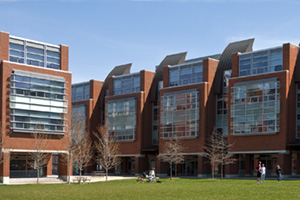Explore research, solve clues and win prizes in Virtual Scavenger Hunt
January 31, 2014

The University of Ontario Institute of Technology is one of 21 Ontario Universities launching a Virtual Scavenger Hunt to take the public on an intriguing online journey through the world of university research.
Organized by the Council of Ontario Universities (COU), the contest is open to students and the general public and runs from Monday, February 3 until Tuesday, March 4.
Answer clues every day to be entered for daily prizes. There will be 21 clues in all – one for each participating university. Participants who get all 21 clues correct will be able to unlock a secret message they can submit to be entered into daily draws for 20 general prizes (available to all participants) and five cash grand prizes of $500 each (only available to university students).
To enter for daily prizes, you must register for the contest and submit the correct answer by
11:59 p.m. on the day the clue is released. Prize winners will be chosen at random from correct answers.
To participate, visit the Virtual Scavenger Hunt webpage and register for notifications about the contest launch and daily clues. Share the contest information with students, colleagues, friends and family – everyone is welcome to participate. Have fun learning a little bit more about the wonderful research being undertaken at Ontario universities!
“We hope the public will play and enjoy the Virtual Scavenger Hunt,” says Max Blouw, COU Chair. “It’s a fun puzzle that will open the window to some truly fascinating research going on at Ontario universities – research that is transforming lives for the better.”
The puzzle – part of COU’s Research Matters campaign to raise awareness about Ontario university research – was designed by University of Toronto student and enigmatologist Stacy Costa.
"We made the puzzle challenging enough to keep it interesting, but players don't need any specialized knowledge to solve the clues," says Costa. "I think anyone who plays even one or two of the daily clues will find themselves drawn into competing for the grand prizes."
“The public will be amazed when they discover some of the research that our universities are conducting,” says Bonnie M. Patterson, COU President and CEO. “The Virtual Scavenger Hunt will put a spotlight on 21 fascinating research projects, but that is just the tip of the iceberg. We hope that as a result of this contest, Ontarians will take new pride in the research going on in their own province.”
- Register, view the Virtual Scavenger Hunt video trailer and read more about the Scavenger Hunt.
- Follow Research Matters on Twitter @ontarioresearch and use the hashtag #Scavenger2014.
- Follow Research Matters on Facebook.
Quick facts:
- In 2010, Canadian universities were responsible for more than one-third (38 per cent) of Canada’s research and development activity, conducting more than $11 billion in research.
- Canadian universities conduct almost $1 billion in research annually with the business sector and almost $1 billion in research annually for the not-for-profit sector, addressing pressing health and social needs that affect communities.



